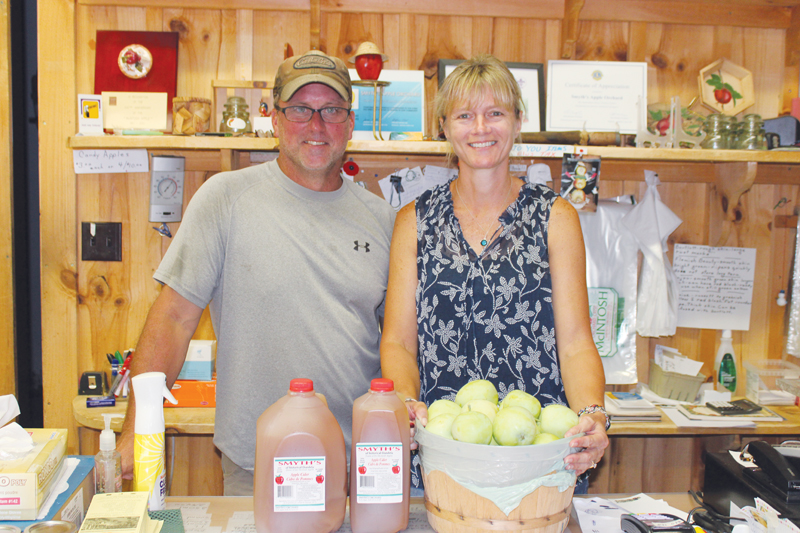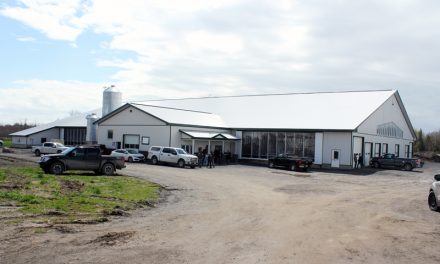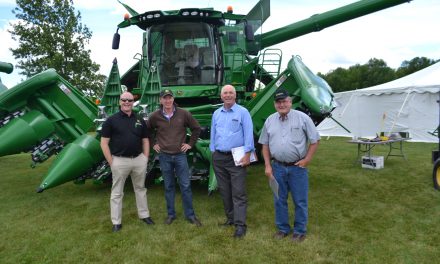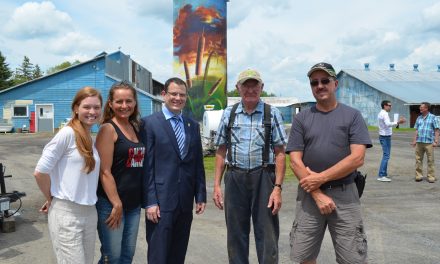Apples and cider and smiles all around
Dean and Nikki Beckstead are shown inside their storefront on opening day of the 2020 apple season. Thompson Goddard photo
DUNDELA – Dean Beckstead runs Smyth’s Apple Orchard with his wife and family. Beckstead is the fifth generation of Smyth family members that strive to continue the tradition of excellence in apple production, which began generations ago by Sam Smyth in the small South Dundas community of Dundela.
After working for Allan McIntosh (whose father John found the first McIntosh trees while clearing his land) Sam Smyth purchased the property which became Smyth’s Apple Orchard.
Aug. 1 was the opening day for the 2020 season at Smyth’s Apple Orchard with Yellow Transparent apples being the first crop ready for sale. There was a steady stream of customers visiting the storefront, which in the front area houses collectables, books and antiques available for purchase. Through the second set of doors were crafts, jams, jellies, sweets, apple cider and of course apples for sale.
The Chesterville Record was at the orchard on opening day, with Beckstead providing information on the work that goes into ensuring the consumer receives the best possible product from their operation. Beckstead explained they have approximately 30,000 plus trees in the orchard with caring for the trees and managing the business being a 7-day a week, 52 weeks a year job. He explained the importance of weather, in determining the success or failure of a crop by describing the effects of weather in seasonal terms.
After harvest time, trees prepare themselves for their winter dormant period by sending the sap into their root system. If there is a flash fall freeze, then the sap may freeze in the trunk or if the winter is not cold enough the insect pests may not die.
In spring the emerging buds can be destroyed, and blossoms damaged by fluctuations in temperature. Too much heat or drought in the summer result in a smaller size of apple or the taste of the apple affected. As harvest time arrives there is the hope for good weather to ensure the apples are picked off the trees before they fall to the ground.
Throughout the year there are a multitude of tasks to be completed in the orchard which include spraying for insects and disease, removing dead branches, pruning each of the 30,000 trees every year, marketing the apples and keeping up to date with government regulations as well as ensuring paperwork is completed.
Located to the back of the storefront are buildings which house the machinery involved in the grading and production of apple cider as well as cold storage rooms, storing packaging materials and the farm equipment sheds.
There are onsite accommodations for temporary workers who have arrived to work in the apple harvest. Beckstead mentioned that COVID-19 regulations have necessitated changes associated with the employment of foreign workers at the orchard.
For Beckstead, all the hard work and worry can be erased in a moment, when one person says, “Thank you very much, we appreciate what you are doing,” commenting this makes “it all worth while.” So, the next time you are enjoying the taste of a fresh apple, a drink of apple cider or perhaps a piece of apple pie – think of the people who have worked long hours to ensure the best possible product finds its way into your home.
The last remaining McIntosh apple tree which had been discovered by John McIntosh on his land grant in nearby Dundela died in the early 1900s. A tree which had been grafted from this tree lived at Smyth’s Apple Orchard until its death in 2011. Thanks to the scientific process of cloning, the original McIntosh tree lives on, in a tree at Smyth’s, located in a grassy patch in the work yard with its fruit just beginning to ripen. This tree provides a connection to the generations of the Smyth family who have worked this land since the mid 1800s. For more information on Smyth’s Apple Orchard, please visit their website at www.smythsapples.com or visit their Facebook page or take a drive to Dundela and see for yourself a piece of agricultural history.













